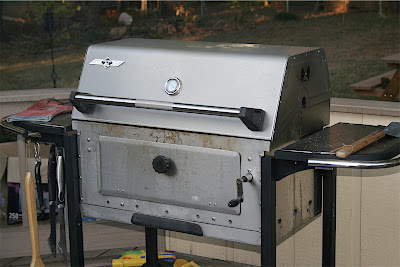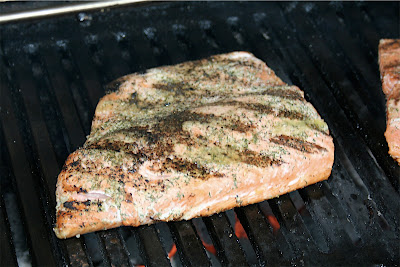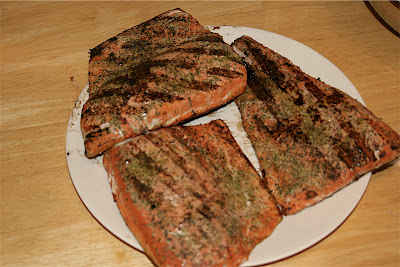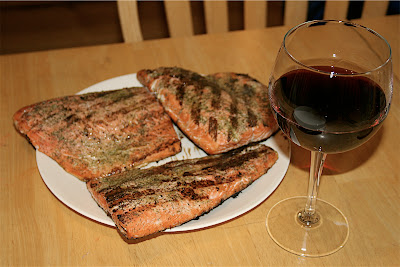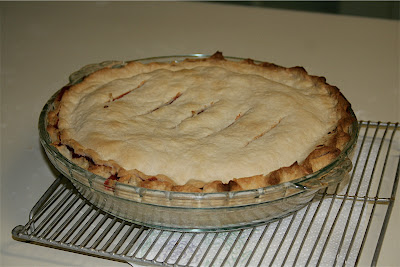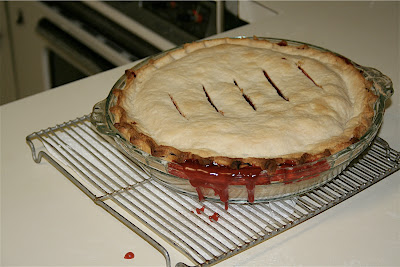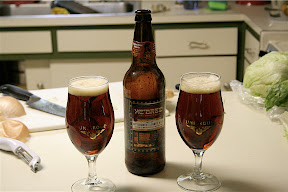Disclaimer: I linked to a couple reviews I wrote for Epinions in this article. If you read my Epinions reviews, you'll earn me credit for traffic. Not like I really care, but I thought I should disclose that I have a material interest (however paltry) in directing you to my reviews.Well, the Fourth of July was a Wednesday this year, so a bunch of us decided there wasn't a lot of point to coming in Monday or Tuesday. Well, Sunday night I was in the grocery store (
after meeting), and I saw pork butts on sale for $0.97 a pound.
So Monday was barbecue day.
Now, barbecue is a greatly misunderstood art form. It's not about sweet and sticky ribs, salty beef brisket, or even vinegar-soaked pig shoulders. Barbecue is about tough cuts of meat, slowly and patiently cooked over coals at around 200F. Whether that meat is brisket, ribs, or hog shoulders; the point is to cook it slowly over coals at around 200F.
Personally, my favourite barbecue is the Eastern North Carolina style: where a whole hog is cooked overnight over coals. The folks out there make their barbecue sauce out of vinegar, water, peppers, and some spices; no sugar, no tomatoes. There are other styles, of course: Texans cook beef with tomatoes and sugar, folks in Kansas City cook beef with molasses, and folks in Memphis use molasses and tomatoes on pig shoulders or ribs.
But North Carolina is where barbecue started, and the flavours and styles vary from county to county. Further east, they cook the whole hog in vinegar. Here in the Piedmont, they cook only pieces of the hog (mainly the shoulders), and they add some sugar and tomato to the sauce. West of here in the mountains, the sauce gets more and more tomatoey, until you get over into Tenessee.
I can't cook a whole hog on my grill, so I just cook shoulders. But I do tend to use the simpler "original" eastern-style sauce. I use a mop sauce loosely based on
Smoky Hale's "Eastern North Carolina Basting Sauce" on p. 245 of
The Great American Barbecue and Grilling Manual (I wrote an
Epinions review too). My version of this sauce is a little different than Smoky's, but I think mine gives a more rounded flavour. And mine reminds me a lot of the sauces I've actually eaten in eastern NC. Here's my mop sauce:
2 C. water
1 1/2 C. white vinegar
1/2 C. apple cider vinegar
1 T. crushed red pepper
1 1/2 T. salt
2 t. black pepper
1 T. garlic powder
2 T. paprika
Just mix all that up and you've got a basting sauce
Now I'll be honest and say I
love the "Memphis style" sauces I buy from
Red Hot and Blue. But I cook pretty exclusively with either my own baste or
Carolina Treet, an excellent "eastern North Carolina" sauce.
This time, I cooked the shoulders for 14 hours, but I think I cut it a little short. It could have used another hour or so. There are those who claim to cook barbecue in eight hours or less, but they're really shorting themselves the final burst of flavour and tenderness that only come in the last couple hours: say after the first twelve.
Well, here's my grill with some meat on it:
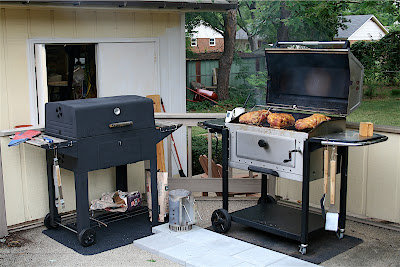
Notice I moved my Santa Fe up by my other grill. Well,
Ames and I lifted it up. I figure my brother-in-law can have it, just as soon as he comes to get it. Until then, I'll keep using it.

My daughter and I prepped the meat and got it cooking before 9:00 AM. I took it off the grill at 11:00 PM. What does prepping involve? For pork butts, it means spreading cheap yellow mustard all over the meat, then sprinkling it with salt, black pepper, and garlic. Then it goes on the grill.
The most important part of barbecue is the temperature. If you look at the photo above, you can see two temperature probes: one in the butt on the left, the other over the butt in the middle. The first measures the temperature of the meat, the other measures the temperature of the grill. Both readings come out on this display:
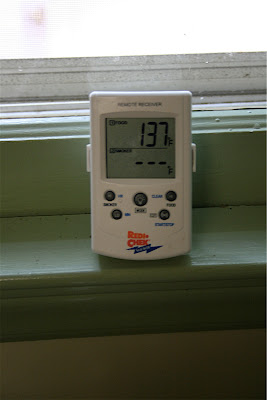
Its range is in the several-hundred-foot neighbourhood. I wrote a
review of this thermometer on
Epinions, if you care.
This go 'round, I created a grease fire on my grill. That is, a grease fire started when I was... er...
detained. When I got
undetained, I checked the temperature and found that is was too hot to register ("HHHH"). Oops! I ran outside in my bare feet, and saw a tremendous grease fire. I managed to stop it, but not before it completely destroyed my pit temperature probe:
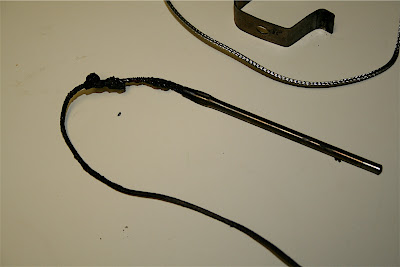
That's why there's only one temperature showing on my thermometer above. I guess I need to replace the pit probe: it permanently reads "HHHH" now. I must have permanently shorted out the thermocouple in there.
Thereafter, I had no remote thermometer, so I had to spend most of the rest of my day in an adirondack chair, sipping a beer, and watching the grill. The built-in thermometer on the grill reads low, but it appears to read
consistently low. That is, it appears to be very consistently 70F too low. So, I sat there, trying to make sure my grill thermometer was reading between 120F and 150F.
As I've said before, the key ingredient in barbecue is temperature control. Sometimes my grill gets too hot, so I have these little wooden blocks that I use to prop the lid open and lower the temperature a little. They're basically a cut 2X4, with a groove routed in them:
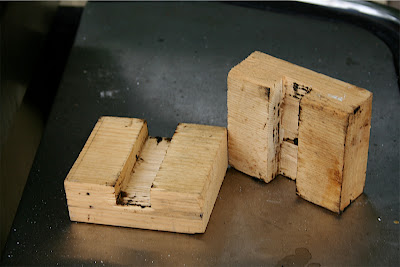
They sit on the lip of the grill and keep the lid cracked (these are old photos):
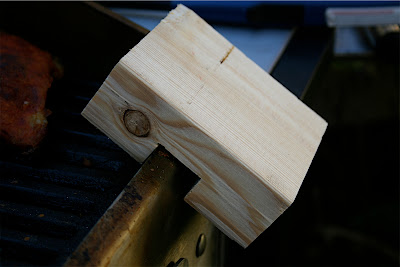

Well, after 14 hours and a few of these:
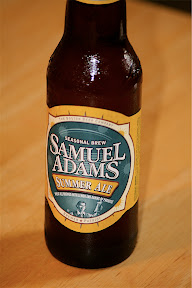
I finally took the meat off the grill at 11:00PM. It could've used a couple more hours, but I think it was (all in all) a good day's work:

Now
that is a relaxing day.
